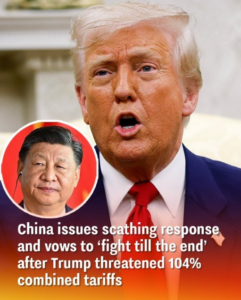In a dramatic escalation of economic tensions, China has issued a fierce and unyielding response to former U.S. President Donald Trump’s latest threat to impose combined tariffs of 104% on Chinese imports. Labeling the move as “economic bullying,” Chinese officials vowed to “fight till the end,” signaling a potential return to the volatile trade war dynamics that defined much of Trump’s first term in office.
The former president, who is campaigning for a return to the White House in 2024, recently unveiled a bold and controversial proposal to slap tariffs on all foreign imports, with a particularly aggressive stance on China. He proposed a baseline 10% tariff on all imported goods and a staggering 60% or more on Chinese-made products, culminating in a potential total of 104% when combined with existing duties. Trump argued the move would bolster American manufacturing and punish what he called China’s “economic warfare” against the U.S.
China’s response was swift and biting. A spokesperson for the Ministry of Commerce denounced Trump’s plan as “an act of hostility that defies global trade norms and damages the spirit of fair competition.” The statement continued: “If the United States chooses confrontation, China will not back down. We will fight till the end to defend the interests of our people, our economy, and our sovereignty.”
Analysts warn that such rhetoric, if followed by action, could reignite the trade tensions that rattled global markets during Trump’s presidency. The previous trade war between the two economic giants saw hundreds of billions of dollars in tariffs and counter-tariffs, disrupting supply chains and prompting fears of a broader economic downturn.
Beijing also hinted at possible retaliatory measures, including targeted tariffs on key American exports such as agricultural goods, aircraft, and high-tech products. Additionally, there are concerns that China could take more aggressive steps, such as restricting rare earth exports or increasing scrutiny on U.S. companies operating within its borders.
Trump’s proposal has sparked mixed reactions at home. Supporters praise his tough stance, believing it will protect American jobs and counter China’s global influence. Critics, however, warn that such high tariffs would likely raise prices for American consumers, provoke retaliation, and risk a damaging trade war at a fragile time for the global economy.
The Biden administration has not commented directly on Trump’s latest remarks, but officials have emphasized a more multilateral approach to dealing with China. Meanwhile, Chinese state media has framed Trump’s comments as a “desperate political stunt” aimed at energizing his voter base by reviving nationalist, anti-China sentiment.
With the 2024 U.S. presidential election looming, trade policy is once again at the forefront of international relations. Whether Trump regains power or not, his comments have already reignited old tensions and signaled that the U.S.-China economic rivalry is far from over. As both sides dig in, the global community watches anxiously, bracing for the potential fallout of another high-stakes showdown.
